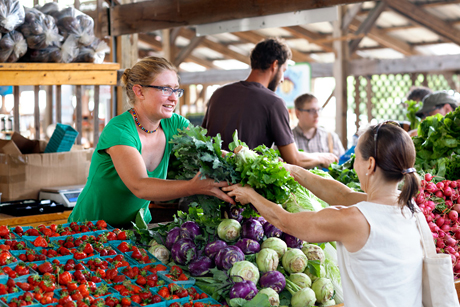Study: Food hubs' support for local economy is mixed
By Stacey Shackford

As the consumer appetite for locally sourced food products increases, so has interest in “food hubs” that facilitate the purchase, marketing and distribution of agricultural products within a region. But what is their economic value?
A three-year study by Cornell researchers suggests that growth in these local farm aggregation and distribution businesses may provide economic benefits to local communities, but that some other businesses may suffer.
In a report released in December through the U.S. Department of Agriculture, researchers found that medium-scale farms benefited the most from the services that food hubs provide, especially freight and storage facilities, and access to new wholesale markets.
Those businesses, in turn, were more likely than commodity-oriented farms to spend their money in the local economy, and that had important “multiplier” impacts. This means that for every additional dollar spent on food hubs, more money stays and is re-spent in the local economy. The researchers estimated that food hubs have higher multiplier impacts than similar types of industry sectors – like wholesale trade, truck transportation or warehousing and storage.
However, they also found that additional local purchases from food hubs result in a corresponding decrease of roughly 10 percent in purchases from businesses offering substitutable products.
“As such, thinking about ways that economic development efforts can work with existing businesses in meeting growing demand for local food may be more productive for the local economy,” said associate professor Todd Schmit, M.S. ’94, Ph.D. ’03, of the Dyson School of Applied Economics and Management, who conducted the study with Ph.D. candidate Becca Jablonski ’03, in the field of city and regional planning, and senior extension associate David Kay, M.S. ’93, of the Community and Regional Development Institute.
Trumansburg food hub Regional Access was used as the case study. It began 25 years ago as a small distribution center in the garage of organic farmer Gary Redmond ’71 and now distributes the products of more than 150 regional farms and small-scale producers to retailers, restaurants, institutions and individuals across New York state, operating out of a 25,000-square-foot warehouse.
The research team collected data from the organization and surveyed food hub suppliers and customers.
“Customer survey results provide evidence that there are opportunities for expansion within the food hub sector, primarily through improved logistics – lower minimum order sizes and increased frequency of deliveries – and expanded product offerings,” the report states.
David Holm, program manager for the Northeast Region’s Sustainable Agriculture Research and Education Program, which helped fund the study, said the publication is an essential reference.
“By studying the report, sustainability advocates can better understand how food hubs make a vital contribution to local communities: Improved farm product marketing supports the economic viability of farmers and customers by meeting growing consumer demands for greater quantities of more diverse types of food produced locally,” Holm said.
Schmit hopes the study will also be valuable to other researchers, as one of its objectives was to build a transparent, replicable framework for assessing the impacts of other food hubs.
“At Cornell, we started receiving requests from Cooperative Extension educators and municipal officials about the impacts of food hubs, and whether or not time and financial support should be given to these business development efforts,” Schmit said. “But when we looked at existing reports to find evidence of their impacts, we couldn’t find anything, nor could we find an agreed upon methodology for how the impact assessment should be conducted.”
Funding for the study came from with the Agricultural Marketing Service of the U.S. Department of Agriculture and the National Institute for Food and Agriculture.
Stacey Shackford is staff writer for the College and Agriculture and Life Sciences.
Media Contact
Get Cornell news delivered right to your inbox.
Subscribe